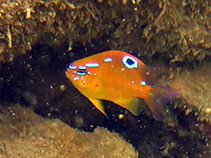| Family: |
Pomacentridae (Damselfishes), subfamily: Pomacentrinae |
| Max. size: |
13.5 cm TL (male/unsexed) |
| Environment: |
reef-associated; marine; depth range 1 - 20 m, non-migratory |
| Distribution: |
Indo-West Pacific: Sri Lanka to the Indo-Australian Archipelago including Sumatra, Java, Sulawesi, and the Solomon Islands. Records from other locations are mostly misidentifications. |
| Diagnosis: |
Dorsal spines (total): 13-13; Dorsal soft rays (total): 15-16; Anal spines: 2-2; Anal soft rays: 13-15. Description: Overall brown, middle dorsal-fin base spot black with margin blue (absent in larger ones), base of last dorsal rays spot smaller blue. Body depth 1.6-1.8 in SL (Ref. 90102). |
| Biology: |
Adults inhabit coral reefs (Ref. 9710), probably subject to surge to 20 m depth. Poorly known species that is seldom seen. Probably overlooked because of the drab appearance. Juveniles unknown and probably have large ocellus like N. thoracotaeniatus (Ref. 48636). Life history characteristics for the family specify that this group is oviparous, with distinct pairing during breeding (Ref. 205). Eggs are demersal and adhere to the substrate (Ref. 205). Males guard and aerate the eggs (Ref. 205). Diurnal species (Ref. 113699). |
| IUCN Red List Status: |
Least Concern (LC); Date assessed: 23 September 2021 Ref. (130435)
|
| Threat to humans: |
harmless |
Source and more info: www.fishbase.org. For personal, classroom, and other internal use only. Not for publication.
